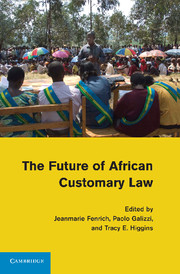Book contents
- Frontmatter
- Contents
- Notes on Contributors
- Acknowledgments
- Introduction
- Part One The Nature and Future of Customary Law
- Part Two Ascertainment, Application, and Codification of Customary Law
- Part Three The Role and Power of Traditional Authorities
- 10 Traditional Courts in South Africa in the Twenty-First Century
- 11 Customary Law and Chieftainship in Twenty-First-Century Botswana
- 12 Traditional Institutions and Governance in Modern African Democracies
- Part Four Customary Land, Property Rights, and Succession
- Part Five Customary Criminal Law
- Part Six Customary Law, Human Rights, and Gender Equality
- Index
- References
12 - Traditional Institutions and Governance in Modern African Democracies
History, Challenges, and Opportunities in Ghana
Published online by Cambridge University Press: 05 February 2012
- Frontmatter
- Contents
- Notes on Contributors
- Acknowledgments
- Introduction
- Part One The Nature and Future of Customary Law
- Part Two Ascertainment, Application, and Codification of Customary Law
- Part Three The Role and Power of Traditional Authorities
- 10 Traditional Courts in South Africa in the Twenty-First Century
- 11 Customary Law and Chieftainship in Twenty-First-Century Botswana
- 12 Traditional Institutions and Governance in Modern African Democracies
- Part Four Customary Land, Property Rights, and Succession
- Part Five Customary Criminal Law
- Part Six Customary Law, Human Rights, and Gender Equality
- Index
- References
Summary
Introduction
In most African countries, constitutionally established authorities exercise the power of government alongside traditional authorities. Executive, legislative, and judicial functions are generally attributed by most modern African constitutions to presidents and prime ministers, parliaments, and modern judiciaries. However, almost invariably the same functions, whether or not formally defined and characterized in the same terms or exercised in the same manner, are also performed by traditional institutions and their leaders. Chiefs administer land and people, contribute to the creation of rules that regulate the lives of those under their jurisdiction, and are called on to solve disputes among their subjects. The relationship between traditional leadership and inherited western-style governance institutions often generates tensions. In Ghana, for example, local governance is an area where traditional leadership and the constitutional government sometimes “lock horns.” Traditional leaders often feel left out when the government takes decisions affecting their people and land without their consent or involvement. Chieftaincy is further plagued with its own internal problems, including issues of relevance, succession, patriarchy, jurisdiction, corruption and intra-tribal conflict. Challenges confronting the institution of chieftaincy have continued from the colonial era into recent times. The role of chieftaincy within post-colonial African countries continues to incite lively debates, as the case of Ghana exemplifies.
- Type
- Chapter
- Information
- The Future of African Customary Law , pp. 266 - 292Publisher: Cambridge University PressPrint publication year: 2011
References
- 3
- Cited by

